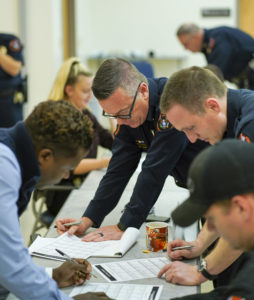UTPD officers have spent the week examining their perceptions, stereotypes and cultural assumptions as a way to better serve and communicate with all members of the Volunteer community.
The new three-day certification training program, offered by the UT Law Enforcement Innovation Center, is designed to increase their cultural competency and reduce biased-based policing in the law enforcement community. Biased-based policing occurs when a police officer initiates an enforcement action based on a person’s race, ethnicity national origin, gender or religion.
The UT Police Department is the first recipient of the program. All UT System law enforcement agencies will receive the training before it is eventually launched nationwide.

Training instructors Dereck Stewart, center, and Teresa Stafford, background, speak with UTPD officers.
“We continually strive to get better as a law enforcement profession,” said UTPD Chief Troy Lane. “This training has allowed us a comfortable place to discuss biases and how to overcome them or at least recognize them and avoid allowing them to influence our actions as law enforcement officers.”
LEIC is offering the training in partnership with the Museum of Tolerance in Los Angeles. Curriculum topics include diversity, self-reflection and self-awareness, de-escalation, critical decision-making, ethics, and bias-based policing. It also examines the process of building trust and respect within the communities officers serve.

UTPD officers doing group work during the training.
“This is a collaborative effort to put together a program that encompasses important areas that helps law enforcement officers be more effective as they police,” said Greg Coker, one of the LEIC instructors.
Other course instructors included Dereck Stewart, a retired Tennessee Highway Patrol colonel, and Teresa Stafford, an LEIC teaching associate.
The cultural competency program was created through the initiative of UT President Randy Boyd, said Rick Scarbrough, LEIC director. In response to the death of George Floyd, Boyd reached out to the UT Institute for Public Service—which houses LEIC—and requested the development of a social justice program for law enforcement across the state. He secured the funding to establish the program.
“He wanted to ensure every law enforcement officer within Tennessee has the opportunity to have this training, in person and virtually,” Scarbrough said.
LEIC provides training to local, regional and national law enforcement agencies in many areas including homeland security, forensic science, command and leadership, and cybercrime.